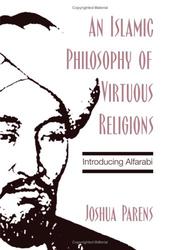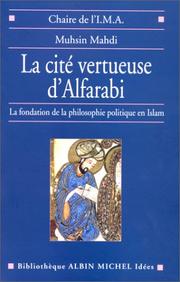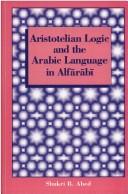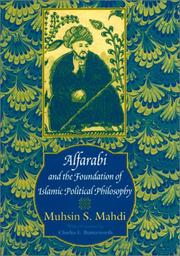| Listing 1 - 10 of 21 | << page >> |
Sort by
|
Book
ISSN: 01698729 ISBN: 9789004206151 9004206159 9786613530509 9004217320 1280126647 9789004217324 9781280126642 Year: 2012 Volume: 85 Publisher: Leiden
Abstract | Keywords | Export | Availability | Bookmark
 Loading...
Loading...Choose an application
- Reference Manager
- EndNote
- RefWorks (Direct export to RefWorks)
This study—the first monograph devoted exclusively to al-Fārābī’s cosmology—provides a new interpretation of this thinker’s philosophical development through an analysis of the Greek and Arabic sources and a contextualization of his life and thought in the cultural and intellectual milieu of his time. It discusses key cosmological and metaphysical concepts articulated in his works, with a special focus on celestial causation, intellection, and motion. This book also examines al-Fārābī’s cosmological method and particularly the connection between astronomy, physics, and metaphysics. The result is a reassessment of al-Fārābī’s cosmology vis-à-vis late-antique Greek philosophical trends and a clearer understanding of how it creatively adapted and transformed this legacy to establish a new cosmological paradigm in Arabic thought.
Islamic cosmology --- Cosmology, Islamic --- Muslim cosmology --- Cosmology --- al-Fārābī, Abū-Nasr Muhammad. --- Abū Nasr Muhammed ibn Muhammed ibn Tarhān ibn Uzlag al-Farabi --- Alfarabius --- Alpharabius --- Fārābī --- Muhammed Ibn Muhammed (Abu Nasir) al-Farabi --- Islamic cosmology. --- Fārābī.

ISBN: 079148212X 1429411775 9781429411776 0791466892 9780791466896 9780791482124 Year: 2006 Publisher: Albany State University of New York Press
Abstract | Keywords | Export | Availability | Bookmark
 Loading...
Loading...Choose an application
- Reference Manager
- EndNote
- RefWorks (Direct export to RefWorks)
Joshua Parens provides an introduction to the thought of Alfarabi, a tenth-century Muslim political philosopher whose writings are particularly relevant today. Parens focuses on Alfarabi's Attainment of Happiness, in which he envisions the kind of government and religion needed to fulfill Islam's ambition of universal acceptance. Parens argues that Alfarabi seeks to temper the hopes of Muslims and other believers that one homogeneous religion might befit the entire world and counsels acceptance of the possibility of a multiplicity of virtuous religions. Much of Alfarabi's approach is built upon Plato's Republic, which Parens also examines in order to provide the necessary background for a proper understanding of Alfarabi's thought.
Islamic philosophy. --- Arabic philosophy --- Muslim philosophy --- Philosophy, Islamic --- Philosophy, Arab --- Fārābī. --- Abū Nasr Muhammed ibn Muhammed ibn Tarhān ibn Uzlag al-Farabi --- Alfarabius --- Alpharabius --- Fārābī --- Muhammed Ibn Muhammed (Abu Nasir) al-Farabi --- Islamic philosophy --- al-Fārābī, Abū-Nasr Muhammad. --- Farabi.
Book
ISSN: 05311888 ISBN: 2711617076 9782711617074 Year: 2004 Volume: 38 Publisher: Paris Vrin
Abstract | Keywords | Export | Availability | Bookmark
 Loading...
Loading...Choose an application
- Reference Manager
- EndNote
- RefWorks (Direct export to RefWorks)
Alexandrian School --- Philosophy, Islamic --- Political science --- History --- Philosophy --- Alexandrian school --- Islamic philosophy --- Administration --- Civil government --- Commonwealth, The --- Government --- Political theory --- Political thought --- Politics --- Science, Political --- Social sciences --- State, The --- Neoplatonism --- Philosophy&delete& --- Fārābī. --- Abū Nasr Muhammed ibn Muhammed ibn Tarhān ibn Uzlag al-Farabi --- Alfarabius --- Alpharabius --- Fārābī --- Muhammed Ibn Muhammed (Abu Nasir) al-Farabi --- al-Fārābī, Abū-Nasr Muhammad. --- Philosophy, Islamic - History --- Political science - Philosophy - History

ISSN: 12428620 ISBN: 2226117490 9782226117496 Year: 2000 Publisher: Paris : Albin Michel,
Abstract | Keywords | Export | Availability | Bookmark
 Loading...
Loading...Choose an application
- Reference Manager
- EndNote
- RefWorks (Direct export to RefWorks)
Islamic philosophy --- Political science --- Philosophie islamique --- Science politique --- History --- Histoire --- Fåaråabåi --- Droit islamique --- Idees politiques --- Islam et politique --- Philosophy --- Philosophie --- Fārābī --- Fåaråabåi --- 297.17 --- 297.17 Islam: religieus geïnspireerde acties; fanatisme --- Islam: religieus geïnspireerde acties; fanatisme --- Political philosophy --- Arabic philosophy --- Muslim philosophy --- Philosophy, Islamic --- Philosophy, Arab --- Fārābī --- Abū Nasr Muhammed ibn Muhammed ibn Tarhān ibn Uzlag al-Farabi --- Alfarabius --- Alpharabius --- Muhammed Ibn Muhammed (Abu Nasir) al-Farabi --- al-Fārābī, Abū-Nasr Muhammad. --- Political science - Philosophy --- Philosophie islamique - Histoire --- Science politique - Philosophie --- Idees politiques - Histoire - 500-1500 (Moyen Age) --- Islam et politique - Histoire
Multi
ISSN: 13529986 ISBN: 9780854811472 0854811478 Year: 2008 Volume: 12 Publisher: London Warburg institute
Abstract | Keywords | Export | Availability | Bookmark
 Loading...
Loading...Choose an application
- Reference Manager
- EndNote
- RefWorks (Direct export to RefWorks)
Abū Naṣr Muḥammad ibn Muḥammad ibn Ṭarḫān ibn Ūzlāġ al-Fārābī --- Yaḥyá ibn 'Adī --- Anaxagoras --- Rāzī, Abū Bakr Muḥammad ibn Zakariyyā --- Kirmānī, Ḥamīd al-Dīn Aḥmad ibn 'Abd Allāh --- at-Tawhīdī, Abū Hayyān --- Philosophy, Arab --- Philosophy, Medieval --- Medieval philosophy --- Scholasticism --- Arab philosophy --- Arabic philosophy --- Philosophy, Arabic --- Fārābī. --- Abū Nasr Muhammed ibn Muhammed ibn Tarhān ibn Uzlag al-Farabi --- Alfarabius --- Alpharabius --- Fārābī --- Muhammed Ibn Muhammed (Abu Nasir) al-Farabi --- al-Fārābī, Abū-Nasr Muhammad. --- Kirmānī, Ḥamīd al-Dīn Aḥmad ibn 'Abd Allāh, --- Kirmānī, Ḥamīd al-Dīn Aḥmad ibn 'Abd Allāh, - active 1020
Book
ISBN: 9782351595008 Year: 1994 Publisher: Presses de l’Ifpo
Abstract | Keywords | Export | Availability | Bookmark
 Loading...
Loading...Choose an application
- Reference Manager
- EndNote
- RefWorks (Direct export to RefWorks)
C'est un long cheminement qui a conduit la langue arabe de ses débuts à une expression philosophique. À partir du premier monument littéraire qui nous soit parvenu, le Coran, l'évolution a progressivement ajouté, à une langue et à une production très marquées par l'oralité, les caractères propres à l'écriture. À travers l'étude de la langue du Coran et du ḥadīṯ, à travers les disciplines religieuses comme le kalāmou le fiqh, à travers certaines formes littéraires, se sont longtemps manifestés les caractères de l'oralité. Tandis qu'avec les sciences et plus particulièrement la philosophie, les traits caractéristiques de l'écrit vont se trouver affirmés. C'est ce que cherchera à établir la seconde partie de ce travail en analysant ce que nous apporte l'œuvre de Farabi (870-950) dans sa réflexion sur le langage. Héritier des générations qui l'ont précédé, Farabi l'est aussi des grands penseurs de l'Antiquité grecque, et plus particulièrement de Platon et Aristote. Mais il réalisera une synthèse originale et posera une problématique qui lui est propre pour aborder, dans son Kitāb al-ḥurūf(Le livre des lettres), les questions de la naissance du langage et des sciences. Il en ressort un recours et un rapport au langage qui sont tout à fait différents de ceux de ses contemporains. Avec Farabi, la langue philosophique arabe est née, et cette langue a quitté le terrain de l'oralité pour celui de l'écrit. It was a long process which led the Arabic language from its beginnings to a philosophical expression. From the first literary masterpiece that was passed down to us, the Koran, evolution has progressively added, to a language and a literary output which were largely influenced by orality, characters peculiar to written tradition. It was in the study of Koranic and ḥadīthlanguages, in the religious disciplines such as kalāmand fiqhand in certain forms of literature that oral characteristics appeared for a long time pre-eminent. Whereas with sciences and more particularly…
Islamic philosophy --- Philosophy & Religion --- Philosophy --- Arabic philosophy --- Muslim philosophy --- Philosophy, Islamic --- Philosophy, Arab --- Fārābī --- Language. --- Qurʼan --- Language, style. --- Abū Nasr Muhammed ibn Muhammed ibn Tarhān ibn Uzlag al-Farabi --- Alfarabius --- Alpharabius --- Fārābī --- Muhammed Ibn Muhammed (Abu Nasir) al-Farabi --- Al-Coran --- Al-Qur'an --- Alcorà --- Alcoran --- Alcorano --- Alcoranus --- Alcorão --- Alkoran --- Coran --- Curān --- Gulan jing --- Karan --- Koran --- Koranen --- Korani --- Koranio --- Korano --- Ku-lan ching --- Ḳurʼān --- Kurāna --- Kurani --- Kuru'an --- Qorān --- Quräan --- Qurʼān al-karīm --- Qurʺon --- Xuraan --- Κοράνιο --- Каран --- Коран --- קוראן --- قرآن --- philosophie --- Langue arabe --- Islam --- linguistique
Book
ISBN: 9782296044487 2296044484 Year: 2007 Volume: *92 Publisher: Paris L'Harmattan
Abstract | Keywords | Export | Availability | Bookmark
 Loading...
Loading...Choose an application
- Reference Manager
- EndNote
- RefWorks (Direct export to RefWorks)
Plotinus --- Augustine, --- Fârâbî --- Influence --- Comparative Classical Philosophy --- Fârâbî. --- Plotinus. --- Plotin --- Plotinos --- Abū Nasr Muhammed ibn Muhammed ibn Tarhān ibn Uzlag al-Farabi --- Alfarabius --- Alpharabius --- Fārābī --- Muhammed Ibn Muhammed (Abu Nasir) al-Farabi --- Avgustin, Blazhennyĭ, --- Augustinus, Aurelius, --- Augustyn, --- Augustin, --- Ughasṭīnūs, --- Agostino, --- Agustí, --- Augoustinos, --- Aurelius Augustinus, --- Augustinus, --- Agustín, --- Aurelio Agostino, --- Episkopos Ippōnos Augoustinos, --- Augoustinos Ipponos, --- Agostinho, --- Aurelli Augustini, --- Augustini, Aurelli, --- Aurelii Augustini, --- Augustini, Aurelii, --- Ōgostinos, --- Agostino, Aurelio, --- אוגוסטינוס הקדוש --- أغسطينوس، --- 奥古斯丁 --- Influence. --- al-Fārābī, Abū-Nasr Muhammad. --- Avgustin, --- Augustinus, Aurelius --- Agostinho --- Augustine of Hippo --- Augustine d'Hippone --- Agostino d'Ippona --- Augustin d'Hippone --- Augustinus Hipponensis, sanctus --- Sant'Agostino --- Augustinus van Hippo --- Aurelius Augustinus --- Aurelio Agostino --- 聖アウグスティヌス --- アウグスティヌス --- Boluoding --- Iflūṭīn --- Plotino --- Plōtinos --- Plotinus, --- Plotyn --- Πλωτι̂νος --- פלוטינוס --- أفلوطين --- Augustine --- Plotinus - Influence --- Augustine, - Saint, Bishop of Hippo

ISBN: 079140398X Year: 1991 Publisher: Albany, NY : State University of New York [SUNY] Press,
Abstract | Keywords | Export | Availability | Bookmark
 Loading...
Loading...Choose an application
- Reference Manager
- EndNote
- RefWorks (Direct export to RefWorks)
Language and logic --- Logic --- Linguistics and logic --- Logic in language --- Language and languages --- Semantics --- Argumentation --- Deduction (Logic) --- Deductive logic --- Dialectic (Logic) --- Logic, Deductive --- Intellect --- Philosophy --- Psychology --- Science --- Reasoning --- Thought and thinking --- Terminology&delete& --- History --- Methodology --- Aristotle. --- Fārābī --- Abū Nasr Muhammed ibn Muhammed ibn Tarhān ibn Uzlag al-Farabi --- Alfarabius --- Alpharabius --- Fārābī --- Muhammed Ibn Muhammed (Abu Nasir) al-Farabi --- Aristoteles --- Aristote --- Aristotle --- Aristotile --- Language. --- Aristoteles. --- al-Fārābī, Abū-Nasr Muhammad --- Arisṭāṭṭil --- Aristo, --- Aristotel --- Aristotele --- Aristóteles, --- Aristòtil --- Arisṭū --- Arisṭūṭālīs --- Arisutoteresu --- Arystoteles --- Ya-li-shih-to-te --- Ya-li-ssu-to-te --- Yalishiduode --- Yalisiduode --- Ἀριστοτέλης --- Αριστοτέλης --- Аристотел --- ארסטו --- אריםטו --- אריסטו --- אריסטוטלס --- אריסטוטלוס --- אריסטוטליס --- أرسطاطاليس --- أرسططاليس --- أرسطو --- أرسطوطالس --- أرسطوطاليس --- ابن رشد --- اريسطو --- Pseudo Aristotele --- Pseudo-Aristotle --- アリストテレス --- Terminology

ISBN: 0585078238 0585078238 9780585078236 0791403971 079140398X 0791494098 9780791403976 9780791494097 Year: 1991 Publisher: Albany, N.Y. State University of New York Press
Abstract | Keywords | Export | Availability | Bookmark
 Loading...
Loading...Choose an application
- Reference Manager
- EndNote
- RefWorks (Direct export to RefWorks)
Logic --- Language and logic. --- Linguistics and logic --- Logic in language --- Language and languages --- Semantics --- Argumentation --- Deduction (Logic) --- Deductive logic --- Dialectic (Logic) --- Logic, Deductive --- Intellect --- Philosophy --- Psychology --- Science --- Reasoning --- Thought and thinking --- Terminology --- History. --- Methodology --- Fārābī --- Aristotle --- Aristoteles --- Aristote --- Arisṭāṭṭil --- Aristo, --- Aristotel --- Aristotele --- Aristóteles, --- Aristòtil --- Aristotile --- Arisṭū --- Arisṭūṭālīs --- Arisutoteresu --- Arystoteles --- Ya-li-shih-to-te --- Ya-li-ssu-to-te --- Yalishiduode --- Yalisiduode --- Ἀριστοτέλης --- Αριστοτέλης --- Аристотел --- ארסטו --- אריםטו --- אריסטו --- אריסטוטלס --- אריסטוטלוס --- אריסטוטליס --- أرسطاطاليس --- أرسططاليس --- أرسطو --- أرسطوطالس --- أرسطوطاليس --- ابن رشد --- اريسطو --- Pseudo Aristotele --- Pseudo-Aristotle --- アリストテレス --- Abū Nasr Muhammed ibn Muhammed ibn Tarhān ibn Uzlag al-Farabi --- Alfarabius --- Alpharabius --- Fārābī --- Muhammed Ibn Muhammed (Abu Nasir) al-Farabi --- Language. --- Contributions in logic. --- Logic - Terminology - History.

ISBN: 0226501868 Year: 2001 Publisher: Chicago ; London : University of Chicago Press,
Abstract | Keywords | Export | Availability | Bookmark
 Loading...
Loading...Choose an application
- Reference Manager
- EndNote
- RefWorks (Direct export to RefWorks)
Islamic philosophy --- Political science --- Philosophie islamique --- Science politique --- Philosophy. --- Philosophie --- Farabi --- Philosophy, Islamic --- -Administration --- Civil government --- Commonwealth, The --- Government --- Political theory --- Political thought --- Politics --- Science, Political --- Social sciences --- State, The --- Arabic philosophy --- Muslim philosophy --- Philosophy, Arab --- Philosophy --- Alpharabius --- Alfarabius --- Abennasar --- Muḥammad ibn Muḥammad al-Fārābī --- Uzluk oğlu Farâbî --- Fārābī, Muḥammad ibn Muḥammad --- Abu Nasr Mukhammad alʹ-Farabi --- Farabi, Abu Nasr Mukhammad --- Abu-Nasr alʹ-Farabi --- Abū Naṣr Fārābī --- Alfarabi --- Alfārābī, Abu Nasr --- Abu Nasr Alfārābī --- Avennasar --- Abu Nasr Forobiĭ --- Форобий, Абу Наср --- Forobiĭ, Abu Nasr --- alʹ-Farabi --- Al-Faraby --- Abu Nasr Muhammet ibn Muhammet ibn Tarhan ibn Uzlug Faraby --- Faraby, Abu Nasr Muhammet ibn Muhammet ibn Tarhan ibn Uzlug --- Abū Naṣr Muḥammad bin Muḥammad bin Ṭarhkhān bin Ūzluġ al-Fārābī --- Fārābī, Abū Naṣr Muḥammad bin Muḥammad bin Ṭarhkhān bin Ūzluġ al --- -Phwarabi, Abu Nassr --- Pharabi --- פאראבי --- أبو نصر الفارابي --- الفارابي --- فارابي --- فرابي --- Islamic philosophy. --- -Philosophy --- -Arabic philosophy --- Administration --- Abū Nasr Muhammed ibn Muhammed ibn Tarhān ibn Uzlag al-Farabi --- Fārābī --- Muhammed Ibn Muhammed (Abu Nasir) al-Farabi --- Fārābī --- Political philosophy --- Fārābī. --- al-Fārābī, Abū-Nasr Muhammad.
| Listing 1 - 10 of 21 | << page >> |
Sort by
|

 Search
Search Feedback
Feedback About UniCat
About UniCat  Help
Help News
News